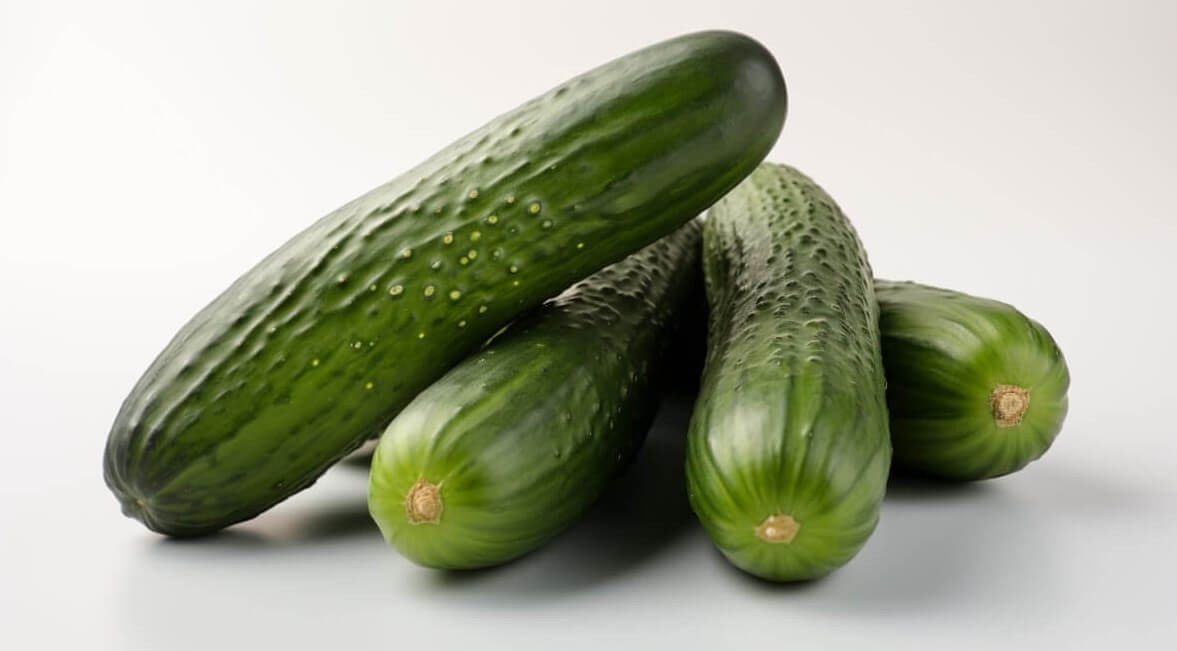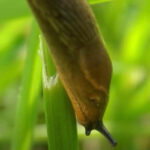Would you prefer to listen to a short podcast discussion about this article? Click on the audio below.
Are you a home veg grower looking to add a new crop to your garden? Cucumbers (cues) are a great choice for those living in the UK, as they grow well in the climate and can provide a bountiful harvest for you and your family. In this article, we will cover everything you need to know about growing and harvesting cucumbers, from selecting the right soil to preserving your harvest through pickling and freezing.
So, let’s get started!
Table of Contents
The Best Soil for Growing Cucumbers
The first step to growing cucumbers in the UK is selecting the right soil. Cues thrive in well-draining soil that is rich in organic matter. If your soil is heavy and clay-like, consider adding compost or well-rotted manure to improve drainage and fertility. Additionally, cucumbers prefer a soil pH between 6.0 and 7.0. You can test your soil’s pH using a soil testing kit, which can be purchased at your local garden centre or online.
When planting your cucumber seeds or seedlings, make sure to space them at least 30 centimetres apart to allow for proper growth and development.
How to Choose the Right Cucumber Variety for Your Family
When selecting cucumber seeds or seedlings, consider the needs and preferences of your family. There are many different cucumber varieties to choose from, including slicing cucumbers, pickling cucumbers, and speciality cucumbers. Slicing cucumbers are great for salads and sandwiches while pickling cucumbers are ideal for making homemade pickles. Speciality ones, such as lemon cucumbers or Armenian cucumbers, can add a unique flavour and texture to your dishes.
Additionally, consider the growing season of your cucumber variety. Some varieties, such as ‘Marketmore’ and ‘Straight Eight’, are well-suited for the UK climate and can be grown outdoors. Other varieties, such as ‘Burpless’ and ‘English Telegraph’, may require a greenhouse or polytunnel to thrive.
Planting Cucumber Seeds: The Dos and Don’ts
When planting cucumber seeds, there are a few dos and don’ts to keep in mind. First, make sure to plant your seeds or seedlings after the last frost date in your area. Cues are a warm-weather crop and cannot tolerate frost. Additionally, make sure to plant your seeds or seedlings in a location that receives full sun for at least six hours per day.
When planting your seeds, plant them one inch deep and cover them with soil. Water your seeds immediately after planting and keep the soil moist but not waterlogged. Once your seedlings have emerged, thin them out to one plant per 30 centimetres to allow for proper growth and development.

How to Care for Cucumber Plants
Caring for cucumber plants in the UK climate requires regular maintenance and attention. Cucumbers require consistent moisture to thrive, so make sure to water your plants regularly, especially during dry spells. However, be careful not to overwater your plants, as this can lead to root rot and other diseases.
In addition to watering, make sure to fertilize your cucumber plants regularly with a balanced fertilizer. You can also add a layer of organic mulch around your plants to help retain moisture and suppress weeds.
Pruning and Training Cucumber Plants for Maximum Yield
To maximize your cucumber yield, consider pruning and training your plants. Pruning involves removing the lateral shoots that grow from the main stem of the plant. This allows the plant to focus its energy on producing fruit rather than foliage.
Training your cucumber plants involves directing their growth along a trellis or support system. This not only saves space in your garden but also allows for better air circulation around the plants, which can help prevent diseases.
How to Water Cucumber Plants
Watering cucumber plants can be a tricky balance. While cucumbers require consistent moisture to thrive, overwatering can lead to root rot and other diseases. To avoid overwatering, make sure to water your plants deeply but infrequently. This means watering your plants once or twice a week, depending on the weather conditions and the moisture level of the soil.
Additionally, make sure to water your plants at the base of the plant rather than from above. This helps prevent water from collecting on the leaves, which can lead to fungal diseases.
Dealing with Pests and Diseases in Your Cucumber Garden
Like all plants, cues are susceptible to a range of pests and diseases. Common pests include aphids, spider mites, and cucumber beetles. These pests can be controlled through the use of insecticidal soap or neem oil. Additionally, you can plant companion plants, such as marigolds or nasturtiums, to help repel pests.
Common diseases that affect cucumber plants include powdery mildew and downy mildew. These diseases can be prevented through proper maintenance practices, such as watering at the base of the plant and providing adequate air circulation. If your plants do become infected, consider using a fungicidal spray to control the disease.
Harvesting Cucumbers: Tips for Picking at the Right Time
Knowing when to harvest your cucumbers is essential for getting the best taste and texture. Most cucumber varieties are ready to harvest within 50 to 70 days of planting. To determine if your cucumbers are ready to harvest, look for the following signs:
- The cucumber is firm and evenly coloured
- The cucumber is at least 10 centimetres long
- The cucumber snaps off the vine easily when gently twisted
If your cucumbers are not yet mature, leave them on the vine for a few more days before checking again. Overly mature cucumbers can become tough and bitter.
Recipes for Delicious Cucumber Dishes for the Whole Family
Once you’ve harvested your cucumbers, it’s time to put them to use in the kitchen! Cucumbers are incredibly versatile and can be used in a variety of dishes, from salads to sandwiches to soups. Here are a few recipe ideas to get you started:
- Cucumber and Tomato Salad: Slice cucumbers and cherry tomatoes and toss with olive oil, lemon juice, and salt and pepper to taste.
- Cucumber and Cream Cheese Sandwiches: Spread cream cheese on slices of bread and top with thinly sliced cucumbers.
- Cucumber and Yogurt Soup: Blend cucumbers, plain yoghurt, garlic, and dill in a blender until smooth. Chill and serve.
Preserving Your Cucumber Harvest: Pickling and Freezing Tips
If you have a bumper cucumber crop, consider preserving your harvest through pickling or freezing. Pickling cucumbers can be sliced and canned in vinegar, salt, and spices for a delicious snack or condiment. To freeze cucumbers, slice them and blanch them in boiling water for a few minutes before freezing. Frozen cucumbers can be used in smoothies or soups.
With these tips and tricks, you’ll be on your way to a successful cucumber harvest in no time. Happy growing!
If you are keen on organic gardening, check out The Soil Association website
If you need any further information or assistance with this article, don’t hesitate to Contact Us




















